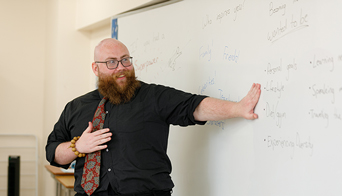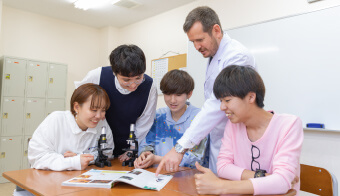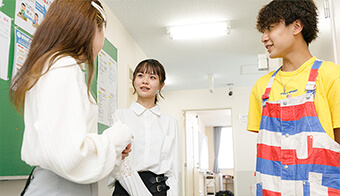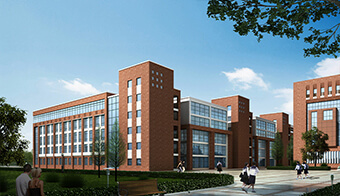ブログ
2017.08.22 行事
【総括】第3回模擬国連大阪(Model United Nations Osaka 2017)が終了しました。
KIHSの生徒たちにとって最も大きな学校行事の1つ、それが模擬国連大会です。
6月の京都大会につづき、模擬国連(MUN)大阪大会が7月19・20日に行われました。

KIHS主催のMUN大阪大会は今年で3回目を迎え、東大寺学園高校や立命館宇治高校、広島女学院高校など合わせて11校、前大会を上回る約200名の高校生が参加しました。昨年度の開催報告ブログはこちら
今回のテーマは「持続可能な開発を通した格差是正」
前回に続き難しいテーマでしたが、どの生徒もその中で問題解決の糸口を掴むため懸命に準備をしてきました。MUN京都大会を経験した生徒たちは、大阪大会ではブロックリーダーを務めました。担当国について詳しく知るだけでなく、同じブロックの生徒達をリードする力が試されたこの大会、ブロックミーティングが始まった時は緊張と不安が入り混じった表情をしていました。
 【↑こちらは7月8日に事前に行われたMock MUNの様子】
【↑こちらは7月8日に事前に行われたMock MUNの様子】
そしていざ本番。ゲストによるスピーチ(下記参照)があり、MUN大阪大会がスタートしました。最初は議長役を務めた生徒達も緊張からか堅く、参加しているKIHS生徒からの発言も少なかったのですが、議論を重ねるうちに次第に熱が入り、発言回数が増えるようになりました。議会の間の時間を使ってブロックリーダーがメンバーに指示を送るなど、他校の生徒たちとうまく連携し、そしてリードしていました。

MUNが終わり、生徒たちに感想を聞いてみたところ、こんな答えが返ってきました。
「しんどかったけど本当に楽しかった!」
「人生でこんなに頭を使い続けたのは初めて」
「他校の生徒とMUNを通して仲良くなれて嬉しかった。」
「内容は分かっているのにそれを英語で伝えられなかった。自分にもっと英語力があれば…もっと勉強しておけばよかった。」

どの生徒もこの大会に参加した事で多くの事を学んだようですね。MUNが終わってからの生徒達の表情は疲労感・達成感・充実感でいっぱいでした。みなさん本当に良く頑張りましたね。この経験は必ず今後に活かされますよ。

社会科・英語科 谷本浩瑛
駐大阪・神戸米国総領事館 広報担当領事 Brooke Spelman氏のスピーチ全文

Good morning, everyone.
I’m Brooke Spelman, the Public Affairs Officer at the U.S. Consulate General Osaka-Kobe.
I am so pleased to be here today, and want to thank everyone at Model UN Osaka Executive Committee – especially Kotani-san – for inviting me here today. I would also like to thank everyone at iHouse Osaka for hosting this exciting event.
The agenda for this year’s event – “Reducing Inequality through Sustainable Development” – is an important one.
As you all know, the 17 Sustainable Development Goals, or Global Goals, that came into effect about a year and a half ago are a universal call to action to end poverty, protect the planet, and ensure that all people enjoy peace and prosperity.
Building on the Millennium Development Goals, the Global Goals will require governments, the private sector, civil society, and citizens alike to partner together to reach the targets set out by the year 2030.
It’s an ambitious objective, but it’s not impossible.
In fact, it’s even more possible because students like you are taking the time to study the issues, research different countries’ positions, and propose realistic solutions. Your work today will make a difference.
So, I’d like you all to keep in mind a couple of things as you participate in your sessions today and tomorrow.
For one, the specific goals you are focused on – “Quality Education,” “Decent Work and Economic Growth,” and Sustainable Cities and Communities” – are interconnected, as are all of the Global Goals. That means that the key to finding solutions to these problems on one issue will often involve tackling issues more commonly associated with another issue. Don’t be afraid to find these connections and use them to your advantage. Sometimes, this may mean thinking outside of the box and being creative in your ideas, which you should also not hesitate to do.
Second, use this opportunity to sharpen some life-skills that will be valuable for you not only today and tomorrow, but in school, in college, in your career, and in life.
One, of course, is negotiation. You’re going to need to convince your colleagues today that your position and your needs deserve consideration and attention, and you’re going to need to explain to them why that’s the case. Developing a strong case and backing it up with logical reasoning that others can relate to is crucial to being a solid negotiator. Being ready to make compromises and knowing where your limits are is also important in negotiation, so keep that in mind.
Another key skill is partnership. You may have a compelling position, but you may not be able to get support for it unless you partner with another country. Reaching out to others and asking them for help or for cooperation is sometimes not easy. Sometimes our first reaction is to not want to admit that we need help, or that we cannot do something alone. Being strong alone is important, but knowing how to be a partner is also an important skill. So focus on practicing how to be a good partner, as well.
Yet another skill is problem solving. Sometimes it’s easy to get overwhelmed by the sheer size of a problem. It can seem daunting and even impossible to think about a solution. In those types of situations, sometimes it helps to break a problem down into smaller parts, and to address each part separately. Take one aspect of a problem at a time, and be realistic about what can and cannot be accomplished. Doing so will help you find an overall solution, and will make the problem seem less overwhelming.
And lastly, as you engage with your colleagues on these issues, and you discover the challenges of negotiation, partnerships and problem solving, remember that it’s important to always have friends and allies to help you reach your goal.
Whatever country you are representing today, think about whom your friends are, which countries could become your friend, and how you can work together.
In particular, I want you to remember that in the real world, the United States and Japan are friends. Not only are we friends, but we are old friends, and we are good friends. Our friendship is solid, and it is unshakable. We work together around the world to solve many problems, some of which you will be talking about today.
We have worked hard to make it this way, and we will need to work hard to keep it that way in the future.
As we look ahead to the future, it is up to you, the young people of Japan and the United States, to continue that friendship.
So that is my last request of the day. As you think about and tackle these global problems today and tomorrow, remember that if the friendship and alliance between the United States and Japan is strong, together we can help solve these issues. So let’s keep our friendship strong!
In closing, I would like to congratulate you all for being part of this year’s Model UN Osaka event, and I wish you a successful and productive two days.
大阪北ロータリークラブ元会長 鴻池一季氏のスピーチ全文

Good morning everybody.
It is my great pleasure to make a speech at an opening of MUN OSAKA 2017 on behalf of Rotary Club of Osaka North. It is quite meaningful for participating high school students to discuss under the theme of “Reducing Inequality through Sustainable Development”. Through discussions in this MUN you will deepen your knowledge of various international issues and understand different opinions in accordance with different stand points, as well as developing your English presentation ability. The issues of international relations as well as the environments surrounding international communities have been drastically changing in recent years. And those situations are not “a matter of other mountains” which is happening abroad but closely related to our domestic matters and influential to our daily life. Therefore, I believe, that it is very important and meaningful to discuss international issues by way of participating in MUN. Especially the issue of inequality is getting bigger as influence of the waves of globalism has been growing larger. And it is happening in Japan, too. I think equality
issue is quite difficult ,because it is difficult to define equality. Equality varies according to view points, such as ability, chance, start point and result.
Here, let me briefly introduce about a Rotary Club which I am representing today. Rotary Club is an voluntary organization for social services whose activities spread internationally and has long history of 112 years. Its worldwide membership is 1,2000,000 at 32,000 clubs in 166 countries. Rotary clubs have closely collaborated with UN organizations such as UNESCO, UNISEF, etc. Fields of our service extend to those of vocational service, social service, international service and youth service. I am a member of Rotary Club of Osaka North for the last thirty two years engaging in various field of services. For the past years I have been acting as a leader of a committee for Revitalization from East Japan Great Earthquake Disaster. Through these activities, I realize that there so many people who needs supports in this world and that there are so many things we can do to help them.
In this MUN I hope you will acquire a variety of ideas through discussions with other participants and make it a start point to think various matters globally.
I wish all the success of this MUN OSAKA 2017.
Thank you .
↓本校HPはこちら

大阪のインターナショナルスクールなら
関西インターナショナルハイスクール
〒545-00053 大阪市阿倍野区松崎町2-9-36
帰国生・帰国子女受け入れ校
高校卒業資格(NHK学園高等学校との併修制度による)
タグ一覧
- AIG高校生外交官プログラム
- APU
- Australia
- BA.5
- Bournemouth
- CAE
- CEFR
- class
- English
- estar動詞
- FCE
- George Bernard Shaw
- graduation ceremony
- GTEC
- GUP
- Halloween
- HOMESTAY
- HSDJapan
- IELTS
- LESSON
- Listening
- Manual Rios
- MOJO
- MUN
- MySOS
- NISA
- OECD
- PCR検査
- SDGs
- Semana Santa
- ser動詞
- SNS
- Society3.0
- Society4.0
- Society5.0
- Speaking
- Speech Contest
- TCK
- Third Culture Kid
- TOEIC
- USJ
- VRoid
- WFPチャリティーエッセイコンテスト
- WFP賞
- World History
- アイデンティティ
- アジア学院
- アバター
- アルゼンチン
- イカゲーム
- イギリス
- イクサガミ
- インタビュー
- インテックス大阪
- エディオンアリーナ大阪
- オーストラリア
- オーストラリア入国
- オーストラリア出国
- おおさかグローバル塾
- お笑い文化
- お金の勉強
- キューズモール
- クイズ大会
- グラバー園
- クリスマス
- グローバル
- グローバルスタディーズ
- グローバル化
- ケンブリッジ英検
- コミュニケーション力
- ごみ問題
- コロナ
- コロナ禍
- サーフィン
- サッカーコーチ
- シーカヤック
- ジェンダー
- シドニー
- スキー
- スキー研修
- スクーリング
- ストーリーテリング・コンテスト
- ストレス
- スノボ
- スピーチコンテスト
- スペイン語
- スポーツ大会
- セレッソ大阪
- ソーシャルメディア研究会
- ダンス
- ダンスレッスン
- チュニジア
- デジタル
- ドイツ
- ドッジボール
- トラウマ
- バイロンベイ
- ハウステンボス
- ハロウィン
- パンフレット
- ピクトグラム
- フードロス問題
- フィールドスタディ
- フィンランド
- ペンギン水族館
- ホームステイ
- ホームルーム
- ボーンマス
- ホストファミリー
- ボランティア
- ボランティアサークル
- ボランティア参加
- マネーリテラシー
- ランナー
- リーズ大学
- リーダー
- リレー
- ワークショップ
- 一般入試
- 世界史
- 世界経済フォーラム
- 中間試験
- 乗馬
- 九十九島
- 交流会
- 京都外国語大学
- 今村翔吾
- 他者認識
- 体育
- 体育大会
- 併修
- 併修校
- 使える英語
- 保健室
- 先生の言いたいこと
- 先生紹介
- 入国制限
- 入学式
- 八本目の槍
- 公募制推薦入試
- 分野別説明会
- 副学長
- 動物園
- 医療
- 卒業式
- 卒業生
- 南海トラフ大地震
- 台湾
- 台湾の大学
- 台湾留学
- 合格実績
- 同志社大学
- 図書委員
- 国際学部
- 国際理解
- 在日米国大使館助成プログラム
- 地震
- 城
- 塞王の楯
- 外国語
- 多国籍
- 大学
- 大宰府天満宮
- 大浦天主堂
- 大阪マラソン
- 大阪万博
- 大阪府立体育館
- 太宰府天満宮
- 学校生活
- 学校給食支援
- 学習
- 安藤百福名誉博士奨励賞
- 定期試験
- 就職
- 就職内定
- 岸田首相
- 帰国生
- 心理学
- 志賀高原
- 思春期セミナー
- 投資信託
- 授業
- 授業参観
- 推薦入試
- 損害賠償金
- 文学
- 文科省
- 新入生交流会
- 新学期
- 新年度
- 旅行・観光開発ランキング
- 日本グローバル教育学会
- 期末試験
- 未来構想キャンプ
- 株式投資
- 桜花学園大学
- 模擬国連
- 模擬国連大会
- 模擬国連大阪
- 歯科衛生士
- 水危機
- 水族館
- 海外
- 海外の大学
- 海外大学受験講座
- 海外留学
- 渡航
- 災害
- 特別講師
- 玉入れ
- 環境問題
- 生きた英語
- 生徒会
- 留学
- 直木賞
- 短期留学
- 石垣
- 石田三成
- 研修
- 研修会
- 研修旅行
- 神奈川歯科大学
- 稲佐山
- 立命館アジア太平洋大学
- 竹内義博
- 第七波
- 綱引き
- 総合型推薦入試
- 総合型選抜入試
- 緩和
- 翻訳
- 自己理解
- 自己認識
- 自習
- 芸術鑑賞
- 英検
- 英語
- 英語レベル分け試験
- 英語教員
- 英語教育
- 英語教育実施状況調査
- 褒めニケーション
- 試験
- 語学学校
- 語学研修
- 課外活動
- 講演
- 賤ヶ岳の七本槍
- 通訳
- 進学
- 進路
- 進路指導
- 進路説明会
- 道程
- 選択必修科目
- 長崎
- 長野県
- 関西外語専門学校
- 防災研修
- 防犯防災総合展2022
- 阿倍野
- 陰性証明
- 集中科目
- 風頭公園
- 飛田匡介
- 食品ロス問題
- 高村幸太郎
- 高校
- 高校生ボランティアアワード
- 高校生支援
- 龍谷大学





